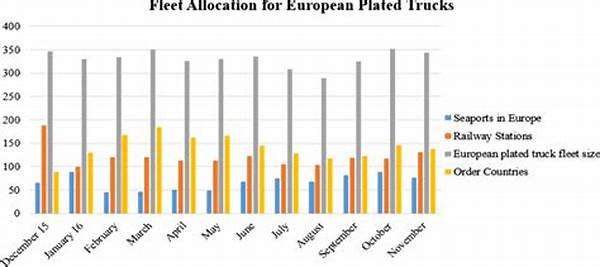
Optimal Fleet Resource Allocation
In the world of logistics and transportation, resource allocation is more than just a strategic advantage—it’s a necessity. Companies striving for success understand that optimal fleet resource allocation can catalyze profits and efficiency. Imagine your company maximizing resources, reducing wastage, and cutting costs, all while enhancing delivery speeds. Achieving optimal fleet resource allocation is not just a fleeting dream; it’s a tangible reality that can revolutionize your business operations.
Read Now : Saturday And Sunday Car Repairs
The Importance of Optimal Fleet Resource Allocation
Optimal fleet resource allocation is the backbone of modern logistics. By strategically managing resources, companies ensure their fleet operates at peak efficiency. Imagine reducing idle times and fuel costs while meeting delivery deadlines and enhancing customer satisfaction. With optimal fleet resource allocation, these benefits are achievable. Businesses thrive when resources are utilized intelligently, leading to increased competitiveness. Moreover, it minimizes environmental impacts, making operations more sustainable. Optimal fleet resource allocation is not merely a concept but the key to an agile and responsive transportation network, crucial in an ever-evolving market landscape.
Strategies for Implementing Optimal Fleet Resource Allocation
1. Data-Driven Decisions: Utilize data analytics to forecast and allocate resources efficiently, ensuring optimal fleet resource allocation.
2. Real-Time Monitoring: Implement GPS and telematics for real-time tracking, enhancing fleet management and ensuring optimal fleet resource allocation.
3. Predictive Maintenance: Use predictive analytics to anticipate maintenance needs, ensuring vehicles are always ready for deployment and contributing to optimal fleet resource allocation.
4. Driver Training Programs: Educate drivers on fuel-efficient practices, contributing to cost savings and optimal fleet resource allocation.
5. Route Optimization Technology: Leverage technology for dynamic route planning, minimizing travel time and ensuring optimal fleet resource allocation.
Benefits of Optimal Fleet Resource Allocation
Companies that invest in optimal fleet resource allocation often see transformative benefits. The immediate impact is noticeable in reduced operational costs and improved service quality. Imagine your fleet functioning like a well-oiled machine, with optimal fleet resource allocation minimizing downtime and resource wastage. This strategic allocation increases profitability, promotes eco-friendly practices, and bolsters your company’s reputation in the market. The seamless integration of technology and strategic resource management creates a dynamic fleet capable of exceeding customer expectations, fostering both loyalty and market expansion.
Read Now : Locked-out Vehicle Recovery Support
Challenges in Achieving Optimal Fleet Resource Allocation
Achieving optimal fleet resource allocation can be daunting, yet the rewards are immense. Many companies face hurdles like outdated technology and resistance to change, but persistence is key. Overcoming these obstacles starts with changing organizational mindsets and embracing innovation. Companies must invest in modern technologies and advanced training to ensure their fleets are always prepared. While the path may require significant investments initially, the resulting savings and enhanced efficiencies prove that striving for optimal fleet resource allocation is worthwhile.
The Future of Optimal Fleet Resource Allocation
Technological Innovations
As technology advances, so does the potential for optimal fleet resource allocation. The incorporation of artificial intelligence and machine learning enables fleets to predict demands and human resources, fine-tuning operations beyond current capabilities. Imagine a world where your fleet adapts dynamically in real-time, reducing costs and surpassing customer expectations. As businesses adopt these advancements, they will ensure efficient and profitable logistics operations. Embracing technology is crucial for any company seeking the upper hand in the competitive world of logistics and transportation, underscoring the importance of optimal fleet resource allocation.
Optimal Fleet Resource Allocation: A Strategic Investment
Investing in optimal fleet resource allocation is not just about surviving in the logistics industry; it’s about thriving. Businesses equipped with intelligent resource management outperform competitors by offering better services at lower prices. This strategic investment reduces fuel consumption and maintenance costs and builds a sustainable competitive edge. By regularly analyzing fleet data and leveraging cutting-edge technologies, companies can adapt quickly to market demands and uncertainties. Optimal fleet resource allocation becomes the bedrock of modern business success, helping companies lead their industries and setting benchmarks in operational excellence.
Conclusion
In summary, optimal fleet resource allocation is the cornerstone of effective logistics management. This approach maximizes resources while minimizing costs, ensuring businesses remain competitive in a challenging market. Companies that embrace strategic resource allocation see significant improvements in operational efficiency and customer satisfaction. As a logistics executive, now is the time to leverage technology and strategic planning for optimal fleet resource allocation. Adopting these practices will undoubtedly lead to a more efficient, profitable, and sustainable operation, benefiting both your company and the environment.